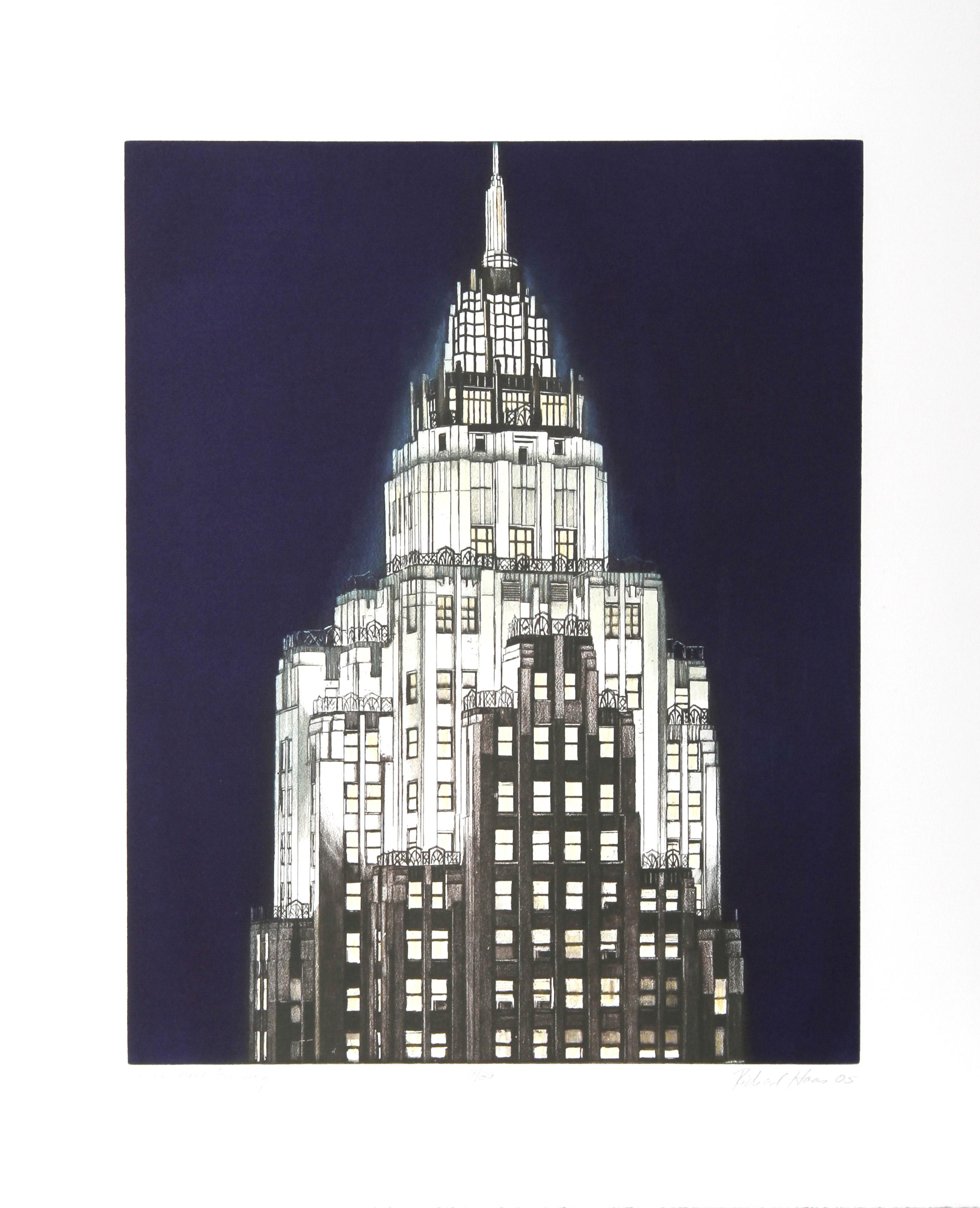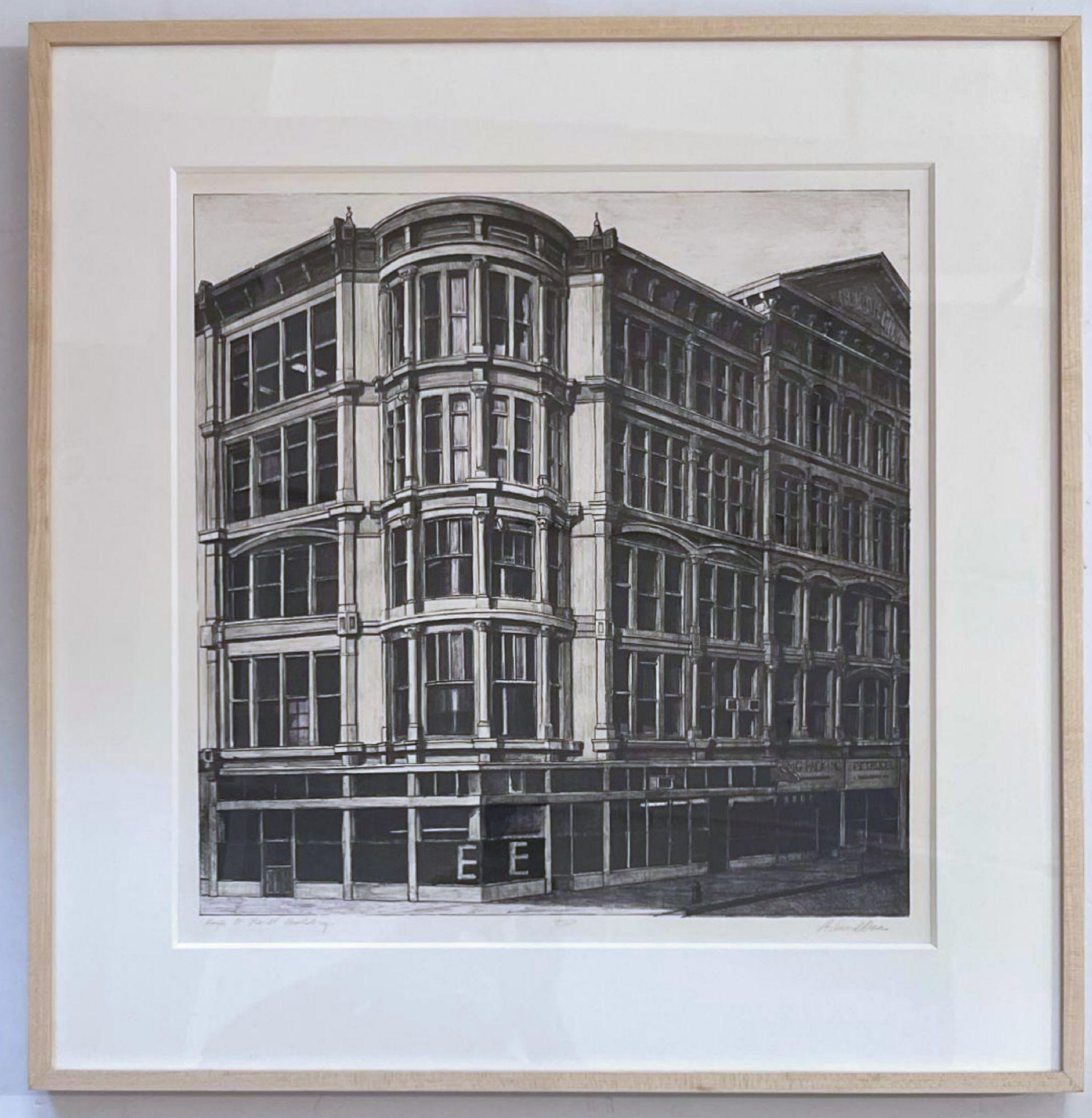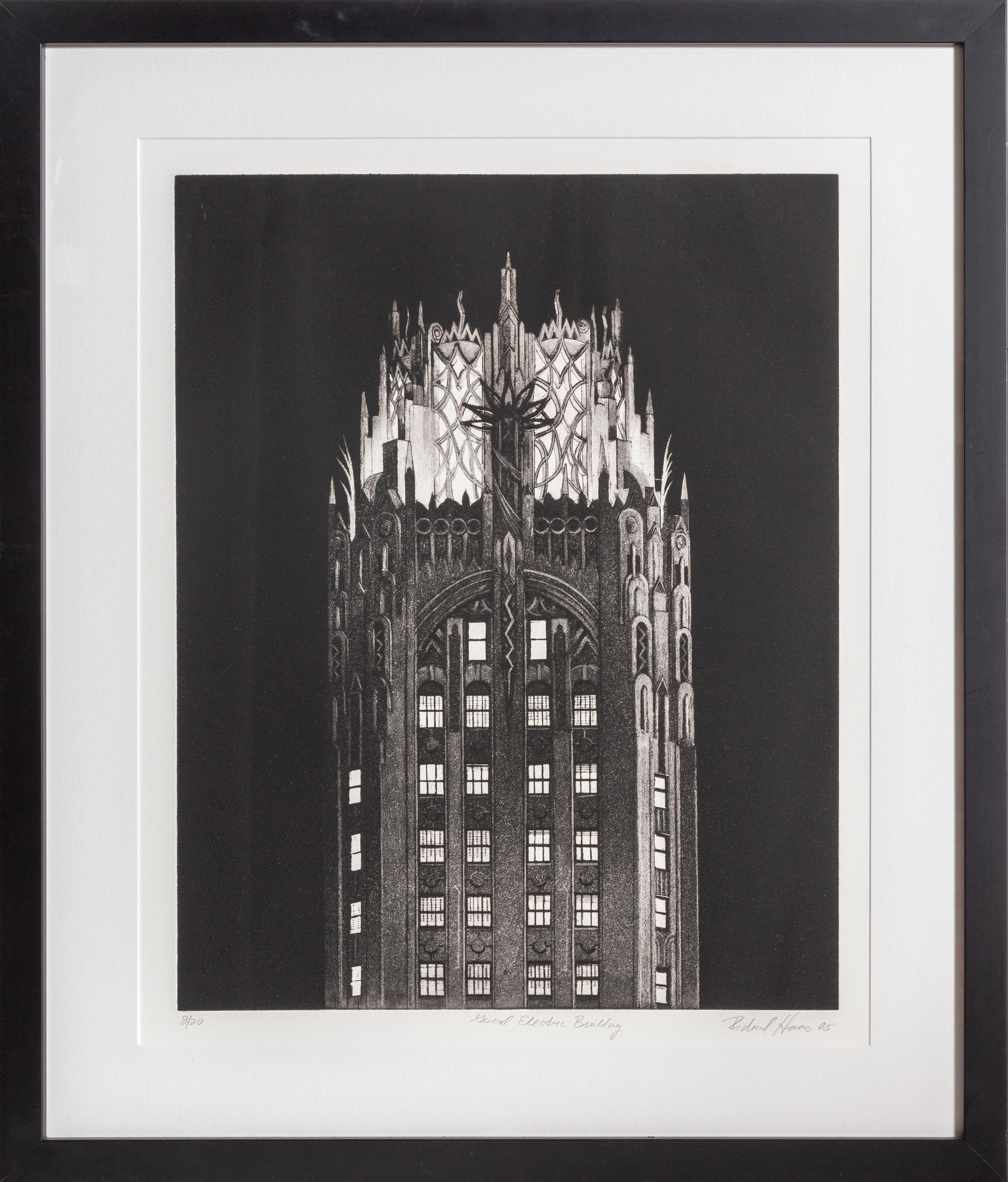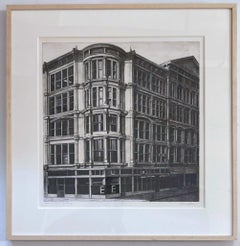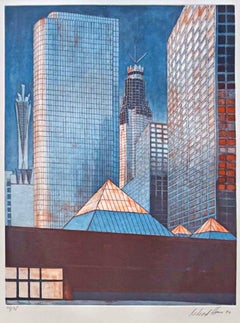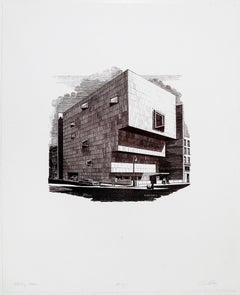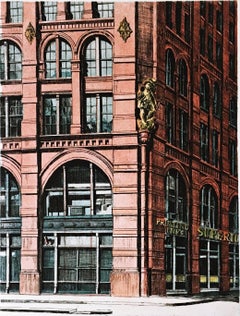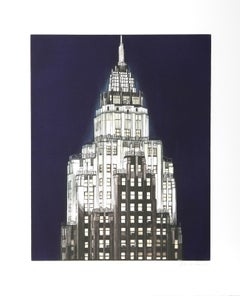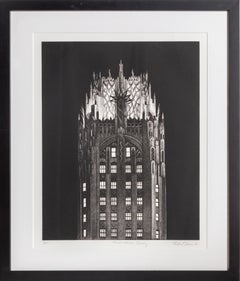Items Similar to City Service Building (70 Pine Street, Manhattan)
Want more images or videos?
Request additional images or videos from the seller
1 of 8
Richard HaasCity Service Building (70 Pine Street, Manhattan)2005
2005
$700
£534.73
€614.35
CA$1,000.85
A$1,102.70
CHF 570.83
MX$13,276.83
NOK 7,228.04
SEK 6,790.28
DKK 4,587.31
About the Item
Richard Haas
City Service Building (70 Pine Street, Manhattan), 2005
Etching
Signed, titled, dated and numbered 7/20 in pencil on the front
20 × 16 inches
Unframed
Rare print by Richard Haas - the world's foremost architectural muralist and trompe l'oeil artist whose prints and paintings are held and exhibited in many private, public and institutional collections. It is framed and ready to hang. Haas - who, aside from his many artistic distinctions, was profiled several years back by the prestigious CBS News cultural magazine show "Sunday Morning".
From the Landmarks Preservation Commission, NYC
The former Cities Service Building at 70 Pine Street is a 66-story skyscraper, rising from a trapezoidal site bounded by Pine Street, Cedar Street, and Pearl Street. An icon of the lower Manhattan skyline, the building’s shaft terminates in a slender pinnacle crowned by an illuminated lantern and stainless steel spire. At the time of completion in 1932, this Art Deco style tower was the tallest structure in lower Manhattan, and at 952 feet, the third tallest structure in the world. Commissioned by a major American corporation, it was an expression of the owner’s success, escalating real estate costs, and the current zoning code that required buildings to diminish in mass as they rise. The Cities Service Company was chartered by Henry L. Doherty in 1910, and quickly grew to become one of the largest corporations in the United States, controlling approximately 150 energy firms in 38 states, including numerous oil and power suppliers. In the late 1920s, Doherty made considerable investments in Manhattan real estate, acquiring 60 Wall Street, which he planned to expand and occupy as his headquarters. When two proposals failed to win the Department of Buildings’ approval, the current site was assembled, costing $2 million. Clinton & Russell, Holton & George served as architect, designing a setback tower, clad with white brick, light gray Indiana limestone, and speckled rose-and-black granite. Thomas J. George is thought to have been the lead designer, enriching the lower floors with stylized reliefs that rival any architectural ornamentation created during the Art Deco period in New York City. Of particular interest is the company’s triangular logo, as well as sunflowers, sunbursts and stepped pyramids, which direct the eye upward and recall the shape of the spire. The northeast and southeast portals are the most distinctive entrances, with four-story-tall archways leading to multistory vestibules connecting the first floor and basement lobbies. At the center of both east portals is a limestone model of the Cities Service Building. In a city crowded with new skyscrapers, this unusual sculptural feature illustrated what had become almost impossible to see – the building in its entirety. Doherty’s headquarters incorporated various innovative features, including escalators linking the lower floors, the city’s first double-deck elevators, and private terraces enclosed by steel railings coated with aluminum lacquer. The opening of the building coincided with Doherty’s return as the company’s chief executive and he intended to occupy the crown as his private triplex. When plans were canceled, the uppermost floor was converted to a public observation gallery, with unsurpassed views of New York harbor. Though completed during the early years of the Great Depression, the Cities Service Building was a modest success. Financed through a public stock offering rather than a mortgage, it reportedly achieved profitability by 1936 and was 90% occupied by 1941. The Cities Service Company was renamed CITGO in 1965 and the building was sold to the American International Group in 1976. Following AIG’s financial collapse in 2008 and a subsequent bailout by the U.S. government, this distinctive tower was acquired by Sahn Eagle LLC in 2009. The Cities Service Building is one of lower Manhattan’s most prominent skyscrapers and one of the finest Art Deco style buildings in New York City.
70 Pine Street (formerly known as the 60 Wall Tower, Cities Service Building, and American International Building) is a 67-story, 952-foot (290 m) residential building in the Financial District of Lower Manhattan in New York City. Built from 1930 to 1932 by energy conglomerate Cities Service Company (later Citgo), the building was designed by the firm of Clinton & Russell, Holton & George in the Art Deco style. It was Lower Manhattan's tallest building and the world's third-tallest building upon its completion.
70 Pine Street occupies a trapezoidal lot on Pearl Street between Pine and Cedar Streets. It features a brick, limestone, and gneiss facade with numerous setbacks. The building contains an extensive program of ornamentation, including the Cities Service Company's triangular logo and solar motifs. The interior features included escalators at the base and double-deck elevators linking the tower's floors. A three-story penthouse, intended for Cities Service's founder Henry Latham Doherty, was instead used as a public observatory.
70 Pine Street's construction was funded through a public offering of stock, rather than a mortgage loan. Despite having been built during the Great Depression, the building was profitable enough that it broke even by 1936, and 90 percent of its space was occupied five years later. The American International Group (AIG) bought the building in 1976, and it was acquired by another firm in 2009 after AIG went bankrupt. The building and its first floor interior were designated as official New York City landmarks in June 2011. In 2016, the building became a luxury rental residential property.
About Richard Haas:
Richard Haas (b. 1936) is an iconic American painter and printmaker known for his trompe l’oeil style architectural murals. He grew up in Spring Green, Wisconsin, not far from Taliesin, Frank Lloyd Wright’s estate. Haas’s early exposure to Wright’s masterful architecture proved to be an enormous influence on his artistic interests. Richard Haas received a BS degree from the University of Wisconsin-Milwaukee and a MFA from the University of Minnesota before moving to New York City. He taught printmaking courses at Bennington College in Vermont for ten years before he decided to pursue a full-time career painting murals. Since 1979, he has painted over 120 murals, many of which were commissioned, at a variety of locations including the former Board of Education building in Brooklyn, the Boston Architectural Center, Chase Field, Edison Brothers Store Inc. in St. Louis, the Federal Building and Courthouse in Kansas City, and the main branch of the New York Public Library. Throughout his career, Richard Haas has also been elected a National Academician by the National Academy of Design, a Guggenheim Fellow, and a McDowell Fellow. He has received the American Institute of Architects Medal of Honor, the New York City Municipal Art Society Award, the Doris C. Freedman Award for Public Art, and the Jimmy Ernst Award of the American Academy of Arts and Letters.
Courtesy of Tandem Press
Bibliography
WATCH CBS News magazine's Sunday Morning's profile of renowned architectural muralist Richard Haas
off-the-wall-with-artist-richard-haas on cbsnews
- Creator:Richard Haas (1936, American)
- Creation Year:2005
- Dimensions:Height: 20 in (50.8 cm)Width: 16 in (40.64 cm)
- Medium:
- Movement & Style:
- Period:
- Condition:
- Gallery Location:New York, NY
- Reference Number:1stDibs: LU1745214091322
About the Seller
5.0
Gold Seller
Premium sellers maintaining a 4.3+ rating and 24-hour response times
Established in 2007
1stDibs seller since 2022
457 sales on 1stDibs
Typical response time: 2 hours
- ShippingRetrieving quote...Shipping from: New York, NY
- Return Policy
Authenticity Guarantee
In the unlikely event there’s an issue with an item’s authenticity, contact us within 1 year for a full refund. DetailsMoney-Back Guarantee
If your item is not as described, is damaged in transit, or does not arrive, contact us within 7 days for a full refund. Details24-Hour Cancellation
You have a 24-hour grace period in which to reconsider your purchase, with no questions asked.Vetted Professional Sellers
Our world-class sellers must adhere to strict standards for service and quality, maintaining the integrity of our listings.Price-Match Guarantee
If you find that a seller listed the same item for a lower price elsewhere, we’ll match it.Trusted Global Delivery
Our best-in-class carrier network provides specialized shipping options worldwide, including custom delivery.More From This Seller
View AllThe Hugh O'Neill Building, 655-671 Sixth Avenue, NYC, lithograph Signed/N Framed
By Richard Haas
Located in New York, NY
Richard Haas
The Hugh O'Neill Building, 655-671 Sixth Avenue, New York City, 1974
Lithograph on Arches paper
Signed, titled and annotated "TP" in graphite pencil on the front
Edition...
Category
1970s Realist Landscape Prints
Materials
Lithograph
Richard Haas, Downtown Los Angeles MOCA, Etching & Aquatint, Signed/N, Framed
By Richard Haas
Located in New York, NY
Richard Haas
Downtown Los Angeles MOCA (Museum of Contemporary Art), 1991
Etching and aquatint on paper with printers blind stamp
SIgned, dated '91 and numbered 14/35 in graphite pen...
Category
1990s Realist Landscape Prints
Materials
Etching, Aquatint
The Whitney (Marcel Breuer Building)
By Richard Haas
Located in New York, NY
Richard Haas
The Whitney (Marcel Breuer Building), 1979
Woodcut engraving
Signed, titled, dated and numbered by the artist on the back. This is a rare Artist Proof 9/10, aside from the regular edition of 60.
22 3/4 × 18 1/4 inches
Unframed
This vintage 1979 woodcut engraving by the world's top architectural muralist and trompe d'oeil artist, Richard Haas, depicts the building New Yorkers nostalgically call the "Old Whitney". Long before the Whitney moved to Manhattan's trendy meatpacking district...
Category
1970s Realist Figurative Prints
Materials
Engraving, Etching
Puck Corner, SOHO, New York signed, numbered by top architectural artist, Framed
By Richard Haas
Located in New York, NY
Richard Haas
Puck Corner, SOHO, New York, 1971
Etching and Aquatint (affixed to white matting)
Hand signed and numbered 10/100 by the artist on the lower front
Elegantly matted and f...
Category
1970s Realist Figurative Prints
Materials
Pencil, Etching, Aquatint
Chelsea Hotel, Sunset
By Richard Haas
Located in New York, NY
Richard Haas
Chelsea Hotel, Sunset, 1980
Offset Lithograph poster on paper
Pencil signed on the front
23 1/4 × 21 1/2 inches
Unframed
This striking offset lithograph poster by the world's top architectural muralist Richard Haas presents a detailed portrait of the historic New York City landmark - the legendary Chelsea Hotel. Many famous people stayed at this storied hotel. Nancy Spungen...
Category
1980s Realist Landscape Prints
Materials
Offset
Villard Courtyard, St. Patrick's Cathedral, New York, Lithograph Signed 23/50
By Richard Haas
Located in New York, NY
Richard Haas
Villard Courtyard, St. Patrick's Cathedral, New York City, 1983
Color lithograph
29 1/2 × 41 1/2 inches
Edition 23/50
Hand signed, numbered, and dated with publisher's b...
Category
1980s Realist Figurative Prints
Materials
Lithograph
You May Also Like
City Services Building, Manhattan - Photorealist Etching by Richard Haas
By Richard Haas
Located in Long Island City, NY
Artist: Richard Haas, American (1936 - )
Title: Cities Services Building (Blue)
Year: 2005
Medium: Etching, signed and numbered in pencil
Edition: 30
Image Size: 20 x 16 inches
Size:...
Category
Early 2000s American Realist Landscape Prints
Materials
Etching, Aquatint
Cities Services Building, Photorealist Architectural Etching by Richard Haas
By Richard Haas
Located in Long Island City, NY
Artist: Richard Haas, American (1936 - )
Title: Cities Services Building
Year: 2005
Medium: Etching, signed and numbered in pencil
Edition: 20
Image Size: ...
Category
Early 2000s American Realist Landscape Prints
Materials
Etching
Cities Services Building (Blue), Photorealist Etching by Richard Haas
By Richard Haas
Located in Long Island City, NY
Richard Haas, American (1936 - ) - Cities Services Building (Blue). Year: 2005, Medium: Etching, signed and numbered in pencil, Edition: 30, Image Size: 20 x 16 inches, Size: 26 x ...
Category
Early 2000s Photorealist Prints and Multiples
Materials
Etching
General Electric Building, Realist Etching by Richard Haas
By Richard Haas
Located in Long Island City, NY
Artist: Richard Haas, American (1936 - )
Title: General Electric Building
Year: 2005
Medium: Etching, signed and numbered in pencil
Edition: 20
Image Size: 20 x 16 inches
Size: 26 x ...
Category
Early 2000s American Realist Landscape Prints
Materials
Etching
$695 Sale Price
22% Off
American Radiator Building, Photorealist Architectural Etching by Richard Haas
By Richard Haas
Located in Long Island City, NY
Artist: Richard Haas, American (1936 - )
Title: American Radiator Building
Year: 2005
Medium: Etching, signed and numbered in pencil
Edition: 20
Image Size...
Category
Early 2000s American Realist Landscape Prints
Materials
Etching
General Electric Building (Blue), Photorealist Etching by Richard Haas
By Richard Haas
Located in Long Island City, NY
Richard Haas, American (1936 - ) - General Electric Building (Blue). Year: 2005, Medium: Etching, signed and numbered in pencil, Edition: 30, Image Size: 20 x 16 inches, Size: 26 x...
Category
Early 2000s Photorealist Prints and Multiples
Materials
Etching
More Ways To Browse
Trompe L Oeil Print
Frank Lloyd Wright Taliesin
L Henry
Indiana Limestone
Vintage Aspen Poster
Vintage Landscape Posters
Vintage Ski Posters Savoie
William S Rice
Yu Heshi
Alex Katz Reflections
Andrew Karoly
Bob Dylan Train
Branko Paradis
Camilla Engstrom
Christo Manhattan
Christo Wrapped Statues
Cj Yao
Claudia Keller
